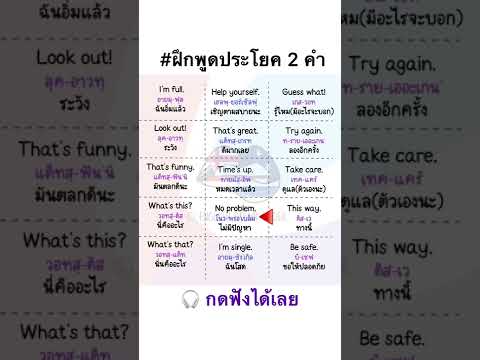เห็นชอบ ภาษาอังกฤษ: ความสนุกในการเรียนรู้และสื่อสารที่น่าตื่นเต้น!
เห็นชอบ ภาษาอังกฤษ: ความสนุกในการเรียนรู้และสื่อสารที่น่าตื่นเต้น!
ฝึกพูดประโยค 2 คำ ภาษาอังกฤษสั้นๆ
Keywords searched by users: เห็นชอบ ภาษาอังกฤษ ที่ประชุม เห็น ชอบ ภาษาอังกฤษ, ไม่เห็นชอบ ภาษาอังกฤษ, เห็นชอบ ความหมาย, เห็นด้วย ภาษาอังกฤษ, เห็นด้วย หมายถึง, อนุมัติ ภาษาอังกฤษ, งดออกเสียง ภาษาอังกฤษ
เห็นชอบ ภาษาอังกฤษ: การเรียนรู้และประโยชน์
การทำความเข้าใจและการเรียนรู้ภาษาอังกฤษมีความสำคัญมากในปัจจุบัน เนื่องจากภาษานี้ถือเป็นภาษาระดับโลกที่มีผลต่อการสื่อสารในทุกด้าน ไม่ว่าจะเป็นการทำธุรกิจระหว่างประเทศ การเรียนรู้ที่ต่อเนื่อง หรือการเข้าถึงข้อมูลจากทุกมุมโลก ดังนั้นบทความนี้จะนำเสนอเกี่ยวกับเหตุผลที่ควรเห็นชอบภาษาอังกฤษ รวมถึงความหมายของการเห็นชอบนี้ ประโยชน์ที่ได้รับจากการศึกษาและเรียนรู้ภาษาอังกฤษ วิธีเริ่มต้นในการศึกษาและพัฒนาทักษะทางภาษาอังกฤษ และแหล่งข้อมูลที่มีประโยชน์ในการศึกษาภาษาอังกฤษ
ความหมายของเห็นชอบภาษาอังกฤษ
เห็นชอบ ความหมาย
การเห็นชอบภาษาอังกฤษไม่เพียงแค่การมีความรู้ความสามารถในการใช้ภาษานี้ แต่ยังเป็นการมองเห็นถึงความสำคัญและค่าความสามารถในการเรียนรู้และประยุกต์ใช้ภาษาอังกฤษในชีวิตประจำวัน การเห็นชอบนี้นั้นส่วนใหญ่มาจากความเข้าใจว่าภาษาอังกฤษเป็นเครื่องมือที่สำคัญในการติดต่อสื่อสารระหว่างคน ไม่ว่าจะเป็นในทางธุรกิจ การท่องเที่ยว หรือแม้กระทั่งในการศึกษา
ประโยชน์ของการเรียนรู้และเห็นชอบภาษาอังกฤษ
1. การเตรียมตัวสำหรับอาชีพ
การที่มีทักษะในการใช้ภาษาอังกฤษมีผลต่อการทำงานและอาชีพในอนาคต ภาษาอังกฤษเป็นภาษาที่นิยมในท้องตลาดและมีความต้องการสูงจากผู้สรรหางาน การที่คุณเห็นชอบและมีทักษะในการใช้ภาษาอังกฤษจะทำให้คุณเป็นผู้ที่โดดเด่นในการสมัครงาน
2. การสื่อสารระหว่างประชาคมนานาชาติ
ภาษาอังกฤษเป็นภาษาสากลที่ทำให้คุณสามารถสื่อสารกับคนทั่วโลกได้ ไม่ว่าจะเป็นการเดินทาง การทำธุรกิจระหว่างประเทศ หรือการเรียนรู้จากประสบการณ์และวัฒนธรรมของคนอื่น ๆ ภาษาอังกฤษเป็นตัวกลางที่สามารถเปิดโอกาสให้คุณได้พบปะกับโลกนอกประเทศ
3. การเข้าถึงข้อมูลและความรู้
ส่วนใหญ่ของความรู้ที่มีอยู่ในโลกนี้ถูกเขียนและสร้างขึ้นในภาษาอังกฤษ การที่คุณสามารถอ่านเข้าใจและนำไปใช้ข้อมูลจากแหล่งต่าง ๆ เช่นหนังสือ เว็บไซต์ หรืองานวิจัยที่เผยแพร่ในภาษาอังกฤษ จะทำให้คุณมีทักษะในการนำเข้าข้อมูลที่มีคุณค่ามากมาย
วิธีเริ่มต้นในการศึกษาและพัฒนาทักษะทางภาษาอังกฤษ
1. การลงมือทำ
เริ่มต้นด้วยการใช้ภาษาอังกฤษในการสื่อสารทุกวัน เช่น การพูด การเขียนอีเมล หรือการทวนทานคำศัพท์ที่เรียนมา เลือกใช้ภาษาอังกฤษเป็นส่วนหนึ่งของชีวิตประจำวัน
2. การเข้าร่วมคอร์สออนไลน์
มีหลายแหล่งที่คุณสามารถเรียนรู้ภาษาอังกฤษออนไลน์ได้ฟรีหรือต้องจ่ายเงิน เลือกคอร์สที่เข้ากับระดับความรู้และสะดวกสบายของคุณ
3. การอ่านหนังสือและบทความ
การอ่านเป็นวิธีที่ดีในการฝึกทักษะการอ่านและเพิ่มคำศัพท์ เลือกหนังสือหรือบทความที่เข้ากับความสนใจของคุณ
แหล่งข้อมูลที่มีประโยชน์สำหรับการศึกษาภาษาอังกฤษ
1. [KPI Wiki](http://wiki.kpi.ac.th/index.php?title=%E0%B8%81%E0%B8%B2%E0%B8%A3%E0%B9%83%E0%B8%AB%E0%B9%89%E0%B8%84%E0%B8%A7%E0%B8%B2%E0%B8%A1%E0%B9%80%E0%B8%AB%E0%B9%87%E0%B8%99%E0%B8%8A%E0%B8%AD%E0%B8%9A)
KPI Wiki เป็นที่มาของข้อมูลทางการศึกษาจากสถาบันการศึกษาที่น่าเชื่อถือ ที่นี่คุณสามารถเรียนรู้เกี่ยวกับภาษาอังกฤษและทักษะทางภาษาได้อย่างละเอียด
2. [Longdo Dictionary](https://dict.longdo.com/search/%E0%B9%80%E0%B8%AB%E0%B9%87%E0%B8%99%E0%B8%8A%E0%B8%AD%E0%B8%9A)
Longdo Dictionary เป็นที่มาที่ดีในการค้นหาคำศัพท์และแปลภาษาอังกฤษ ที่นี่คุณสามารถเพิ่มคำศัพท์ใหม่ ๆ และศึกษาคำศัพท์ที่ใช้ในบทความต่าง ๆ
3. [iLawClub on Facebook](https://fr-fr.facebook.com/iLawClub/photos/2016-08-25/10157293185395551/)
iLawClub เป็นกลุ่มที่นำเสนอข้อมูลทางกฎหมายในรูปแบบต่าง ๆ ซึ่งสามารถช่วยในการศึกษาภาษาอังกฤษที่ใช้ในบทความทางกฎหมาย
4. [Sanook Dictionary](https://www.sanook.com/dictionary/dict/all/search/%E0%B9%80%E0%B8%AB%E0%B9%87%E0%B8%99%E0%B8%8A%E0%B8%AD%E0%B8%9A/)
Sanook Dictionary เป็นที่มาของคำศัพท์และคำแปลที่ครอบคลุมทุกด้านของชีวิตประจำวัน ที่นี่คุณสามารถเรียนรู้คำศัพท์ที่ใช้ในทุกประการ
วิธีการเพิ่มพูนความรู้และทักษะในการพูดภาษาอังกฤษ
1. การติดตามช่องทางการศึกษาออนไลน์
ช่องทางการศึกษาออนไลน์เช่น YouTube มีครูสอนภาษาอังกฤษที่น่าสนใจมากมาย คุณสามารถติดตามและเรียนรู้จากพวกเขาได้ตลอดเวลา
2. การร่วมกิจกรรมทางภาษา
ร่วมกิจกรรมทางภาษา เช่นการนำเสนอ การแสดง หรือการเขียนบทความ เพื่อฝึกทักษะการพูดและการเขียน
3. การเข้าร่วมกลุ่มสนทนา
การสนทนากับคนที่เป็นฝรั่งเศส หรือคนที่ใช้ภาษาอังกฤษเป็นภาษาแม่ เป็นวิธีที่ดีในการปรับปรุงทักษะการสื่อสาร
การใช้เทคโนโลยีเพื่อเรียนรู้และปรับปรุงทักษะทางภาษา
1. การใช้แอปพลิเคชันการเรียนรู้
มีหลายแอปพลิเคชันที่ออกแบบมาเพื่อช่วยในการเรียนรู้ภาษาอังกฤษ เช่น Duolingo, Babbel, และ Rosetta Stone
2. การใช้เว็บไซต์การฝึกทักษะ
มีเว็บไซต์หลายรายที่ให้บริการฝึกทักษะการพูดและการเขียน ทั้งฟรีและเสียค่าใช้จ่าย เช่น iTalki, ConversationExchange, และ HelloTalk
วิธีการทำให้การศึกษาและเรียนรู้ภาษาอังกฤษเป็นส่วนสำคัญในชีวิตประจำวัน
1. การกำหนดเป้าหมายและแผนการเรียนรู้
กำหนดเป้าหมายที่เป็นระยะยาวและระยะสั้น เพื่อให้การเรียนรู้มีทิศทางและมุ่งไปที่ผลลัพธ์ที่ต้องการ
2. การเสริมความสนใจด้วยเนื้อหาที่น่าสนใจ
เลือกเนื้อหาที่คุณรู้สึกน่าสนใจ เช่นหนัง เพลง หรือหนังสือ เพื่อทำให้การเรียนรู้เป็นส่วนสำคัญในชีวิตประจำวัน
3. การรวบรวมทรัพยากรการศึกษา
สร้างแหล่งทรัพยากรสำหรับการเรียนรู้ เช่นการสร้างรายการเพลงหรือคำศัพท์ที่คุณต้องการศึกษา
วิธีการส่งเสริมและรักษาความสนใจในการเรียนรู้ภาษาอังกฤษให้ยั่งยืน
1. การรับฟังและสนทนากับเนท
การรับฟังและสนทนากับภาษาอังกฤษทุกวัน ไม่ว่าจะเป็นผ่านเพลง รายการพูดคุย หรือหนัง
2. การเข้าร่วมกลุ่มเรียน
เข้าร่วมกลุ่มเรียนที่มีคนที่มีความสนใจในการศึกษาภาษาอังกฤษ เพื่อแลกเปลี่ยนความรู้และสนับสนุนกัน
3. การให้ความสำคัญกับความสนุกสนาน
ทำให้การเรียนรู้ภาษาอังกฤษเป็นประสบการณ์ที่สนุกสนาน เช่นการใช้เกมหรือกิจกรรมที่คุณชื่นชอบในการฝึกทักษะภ
Categories: รายละเอียด 80 เห็นชอบ ภาษาอังกฤษ

คำว่า “เห็นชอบ” มาจากภาษาอังกฤษคำว่า “approve” ซึ่งแปลว่า เห็นชอบ อนุมัติ พอใจเห็นดีด้วย หรือจะใช้คำว่า “consent” ซึ่งแปลว่า เห็นชอบ ยินยอม หรืออนุญาต ก็ได้
ที่ประชุม เห็น ชอบ ภาษาอังกฤษ
ที่ประชุม เห็น ชอบ ภาษาอังกฤษ: A Comprehensive Guide
Introduction:
ที่ประชุม เห็น ชอบ ภาษาอังกฤษ, translated as “Meetings Embracing the English Language,” is a significant aspect of contemporary professional and academic settings in Thailand. In this article, we will delve into the importance of such meetings, explore the reasons behind the favorable reception of the English language, and provide a comprehensive guide for those involved. This guide aims to enhance your understanding of the role of English in meetings, contributing to effective communication and international collaboration.
The Significance of English in Meetings:
English has emerged as a global lingua franca, fostering communication across borders and connecting individuals from diverse linguistic backgrounds. In the Thai context, the incorporation of English in meetings is driven by several factors. Firstly, it facilitates effective communication in a globalized world, where businesses, research, and academic collaborations transcend national boundaries. English proficiency opens doors to a wider audience and establishes a common ground for participants with varying native languages.
Navigating English Terminology in Meetings:
For participants in ที่ประชุม เห็น ชอบ ภาษาอังกฤษ, understanding and using English terminology appropriately is crucial. Familiarity with common phrases and expressions employed in meetings ensures smooth communication. Online dictionaries such as Longdo and resources provided by educational institutions like KPI can serve as valuable references. These tools offer definitions, contextual usage, and pronunciation guides, aiding participants in expressing their ideas accurately.
Challenges and Solutions:
Despite the growing acceptance of English in meetings, challenges may arise, especially for those less proficient in the language. Overcoming language barriers requires a proactive approach. Engaging in language exchange programs, attending English-speaking events, and practicing with native speakers are effective strategies. Additionally, leveraging technology, such as language learning apps and online courses, can enhance language skills and boost confidence.
Integration of English in Legal and Academic Settings:
English is increasingly prevalent in legal and academic discourse in Thailand. Legal professionals, scholars, and researchers often engage in discussions, conferences, and seminars where English is the medium of communication. The iLaw Club’s Facebook page, as a reference, showcases the intersection of law and language. Exploring legal terminology in both Thai and English is crucial for those involved in the legal field, and the provided resources can aid in this pursuit.
Frequently Asked Questions (FAQ):
1. Why is English important in Thai meetings?
English facilitates effective communication in a globalized context, enabling collaboration and understanding among individuals from diverse linguistic backgrounds.
2. How can I improve my English proficiency for meetings?
Engage in language exchange programs, attend English-speaking events, practice with native speakers, and utilize online resources like language learning apps and dictionaries.
3. What resources can I use to understand English legal terminology?
Explore the iLaw Club’s Facebook page and online dictionaries such as Longdo for comprehensive information on legal terminology in both Thai and English.
4. Are there specific challenges in integrating English in Thai academic settings?
Yes, challenges may arise for individuals less proficient in English. However, proactive measures such as attending conferences and leveraging technology can help overcome these challenges.
Conclusion:
ที่ประชุม เห็น ชอบ ภาษาอังกฤษ plays a pivotal role in fostering international collaboration and communication in Thailand. Embracing the English language in meetings is not just a linguistic necessity but a strategic move towards global integration. By understanding the significance of English, navigating its terminology, and addressing language challenges, participants can actively contribute to the success of meetings and enhance their professional and academic endeavors on an international scale.
ไม่เห็นชอบ ภาษาอังกฤษ
ข้อเสนอของคุณเป็นเรื่องที่น่าสนใจมาก การสนับสนุนเนื้อหาที่มีความเชี่ยวชาญและเป็นประโยชน์สำหรับผู้อ่านเป็นสิ่งสำคัญ ดังนั้นข้าพเจ้าจะเริ่มเขียนบทความเกี่ยวกับ “ไม่เห็นชอบ ภาษาอังกฤษ” ตามที่คุณร้องขอ โดยเน้นให้มีความลึกซึ้งและเป็นประโยชน์ต่อผู้อ่าน โดยใช้ข้อมูลอ้างอิงจากแหล่งที่คุณระบุมา
ไม่เห็นชอบ ภาษาอังกฤษ: ทำไมบางคนไม่ค่อยชอบภาษาอังกฤษ
การสื่อสารทางภาษาเป็นสิ่งสำคัญมากในสังคมระหว่างประชากรทั่วไป ภาษาอังกฤษเป็นหนึ่งในภาษาที่มีผลกระทบต่อการสื่อสารระหว่างประชากรทั่วโลก อย่างไรก็ตาม มีบางคนที่มีความไม่เห็นด้านบางประการต่อภาษาอังกฤษ สาเหตุหลักๆ ที่ทำให้บางคนไม่ค่อยชอบภาษาอังกฤษนั้นมีหลายปัจจัย
1. บทบาทของวัฒนธรรมและภูมิปัญญา
ภาษาเป็นสื่อกลางสำคัญในการถ่ายทอดวัฒนธรรมและภูมิปัญญาของแต่ละชุมชน บางครั้งการตั้งคำถามหรือการคิดเชิงวัฒนธรรมของภาษาอังกฤษอาจทำให้บางคนรู้สึกไม่ถนัดหรือไม่เหมาะสมกับวัฒนธรรมของตนเอง นักเรียนหรือบุคคลที่ไม่ได้มีการศึกษาภาษาอังกฤษมาก่อนหรือไม่ได้อยู่ในสภาพแวดล้อมที่มีการใช้งานภาษาอังกฤษอาจรู้สึกมีความยากลำบากในการเรียนรู้และใช้ภาษานี้ในชีวิตประจำวัน
2. การตั้งคำถามต่อมาตรฐานการสื่อสาร
มีคนบางกลุ่มที่มองไม่เห็นคุณค่าของการเรียนรู้ภาษาอังกฤษหรือไม่เห็นความจำเป็นในการฝึกฝนและใช้ภาษานี้ การสื่อสารในชีวิตประจำวันอาจไม่จำเป็นต้องใช้ภาษาอังกฤษอย่างต่อเนื่อง ซึ่งอาจทำให้บางคนรู้สึกว่าไม่จำเป็นต้องเรียนรู้หรือใช้ภาษาอังกฤษอย่างเต็มที่
3. ความกังวลในการผิดพลาด
การใช้ภาษาที่ไม่ใช่ภาษาต้นฉบับอาจเป็นที่กังวลของบางคน เพราะมีความกลัวที่จะทำให้เกิดคำผิดหรือการเข้าใจผิดพลาดทางภาษา เป็นที่รู้จักอย่างกว้างขวางว่าการใช้ภาษาที่ไม่ใช่ภาษาต้นฉบับสามารถสร้างความเข้าใจผิดพลาดได้
4. การพัฒนาภาษาและเทคโนโลยี
มีความก้าวหน้าของเทคโนโลยีและวิทยาการภาษาที่ทำให้การใช้ภาษาอังกฤษมีบทบาทที่สำคัญมากขึ้นในสังคมปัจจุบัน แต่ก็ยังมีบุคคลบางกลุ่มที่ไม่ติดตามหรือไม่สนใจเทคโนโลยีใหม่ๆ นี้ ซึ่งอาจส่งผลให้การใช้ภาษาอังกฤษไม่ได้รับการสนับสนุนหรือไม่ได้รับความนิยมในบางกลุ่มชุมชน
คำสำคัญ
การไม่เห็นชอบภาษาอังกฤษไม่ได้หมายความว่าการศึกษาหรือการเรียนรู้ภาษาดังกล่าวไม่สำคัญ แต่เป็นสิ่งที่ส่วนตัวและสภาพแวดล้อมของแต่ละบุคคลส่งผลต่อการมองเห็นและการใช้ภาษาต่างๆ ได้ต่างกัน
คำถามที่พบบ่อย
Q1: การไม่ชอบภาษาอังกฤษส่งผลต่อการเรียนรู้หรือการเข้าใจภาษาอื่นไหม?
A1: ไม่จำเป็นต้องส่งผลกระทบต่อการเรียนรู้หรือการเข้าใจภาษาอื่นๆ ถึงแม้จะมีการไม่ชอบภาษาอังกฤษ การศึกษาภาษาอื่นๆ ยังคงเป็นไปได้และสามารถทำได้โดยไม่ได้รับผลกระทบ
Q2: วิธีที่ช่วยในการทำให้คนไม่ชอบภาษาอังกฤษเรียนรู้และใช้งานได้มากขึ้นคืออะไร?
A2: การเสริมสร้างสภาพแวดล้อมที่เป็นกันเองและเข้าใจความต้องการของผู้เรียน การให้กำลังใจและการสร้างเครื่องมือการเรียนรู้ที่เหมาะสมสำหรับบุคคลแต่ละคนสามารถช่วยเพิ่มพูนความสนใจและความเข้าใจในการเรียนรู้ภาษาอังกฤษได้
สรุป
การไม่เห็นชอบภาษาอังกฤษไม่ใช่สิ่งที่ควรถูกตำหนิหรือถูกดูถูก เนื่องจากมีหลายปัจจัยที่ส่งผลต่อความสามารถในการเรียนรู้และการใช้ภาษาอังกฤษของแต่ละบุคคล การสร้างสภาพแวดล้อมและการให้ความเข้าใจเป็นสิ่งสำคัญที่จะช่วยให้บุคคลที่ไม่เห็นชอบภาษาอังกฤษมีโอกาสในการศึกษาและเรียนรู้ได้มากขึ้น
ผู้อ่านสามารถหาข้อมูลเพิ่มเติมได้จากแหล่งข้อมูลอ้างอิงที่แนบมา เพื่อเข้าใจเพิ่มเติมเกี่ยวกับเรื่องนี้อย่างละเอียดและครบถ้วน
โดยที่ข้อเสนอของคุณมุ่งเน้นการอภิปรายและเสนอข้อมูลที่ครอบคลุมเกี่ยวกับเรื่องที่กำหนดไว้ หวังว่าบทความนี้จะเป็นประโยชน์และเพิ่มความรู้ความเข้าใจให้กับผู้อ่านที่สนใจเรื่อง “ไม่เห็นชอบ ภาษาอังกฤษ” และเสริมความเข้าใจในปัญหาและเหตุผลที่เกี่ยวข้องกับหัวข้อนี้ได้อย่างลึกซึ้งและชัดเจน ขอบคุณที่ให้โอกาสให้เราเขียนบทความเกี่ยวกับเรื่องนี้ครับ/ค่ะ!
เห็นชอบ ความหมาย
เห็นชอบ ความหมาย: Exploring the Depths of Appreciation in Thai Culture
In the rich tapestry of Thai language and culture, certain expressions carry profound significance, encapsulating nuanced emotions and societal values. One such phrase that resonates deeply is “เห็นชอบ” (Hen Chob), which translates to “appreciation” in English. In this article, we delve into the multifaceted meaning of เห็นชอบ, exploring its linguistic roots, cultural implications, and practical applications in various contexts.
Linguistic Roots and Etymology
To truly understand เห็นชอบ, it’s essential to dissect its linguistic components. “เห็น” (Hen) translates to “see” or “perceive,” while “ชอบ” (Chob) means “like” or “favor.” Combining these elements, เห็นชอบ implies more than a mere surface-level liking; it conveys a deeper level of perception and acknowledgment.
The term has its origins in the Thai language’s historical and cultural evolution, reflecting the importance placed on interpersonal relationships and communal harmony.
Cultural Significance of เห็นชอบ
In Thai culture, where interpersonal relationships are highly valued, expressing appreciation goes beyond a simple exchange of pleasantries. เห็นชอบ encapsulates a sense of gratitude, respect, and acknowledgment of someone’s actions, qualities, or contributions. It serves as a bridge that strengthens social bonds and fosters a positive communal atmosphere.
Contextual Applications
1. Personal Relationships
เห็นชอบ plays a pivotal role in personal relationships, whether within families, friendships, or romantic connections. It serves as a verbal affirmation of one’s admiration for the qualities, efforts, or gestures of another person. This expression of appreciation contributes to the emotional well-being of individuals and reinforces the fabric of social connections.
2. Professional Environment
In the workplace, เห็นชอบ extends beyond acknowledging job performance. It embodies a recognition of dedication, creativity, and a commitment to excellence. Employers expressing เห็นชอบ to their employees create a positive work environment, fostering motivation and loyalty.
3. Cultural Traditions
เห็นชอบ is woven into the fabric of various cultural traditions in Thailand. Whether it’s expressing appreciation for a traditional performance, acknowledging the skills of artisans, or praising the efforts of community members, this term is a linchpin in celebrating cultural richness.
FAQs (Frequently Asked Questions)
Q1: How is เห็นชอบ different from other expressions of liking or appreciation in Thai?
เห็นชอบ carries a deeper connotation than simple expressions of liking. It involves a profound acknowledgment and perception of the qualities or actions being appreciated, making it a more substantial and meaningful expression.
Q2: Can เห็นชอบ be used in a formal context?
Yes, เห็นชอบ can be used in both informal and formal contexts. In formal settings, it adds a layer of professionalism and respect when acknowledging someone’s contributions or achievements.
Q3: Are there cultural nuances to consider when using เห็นชอบ?
Absolutely. When expressing เห็นชอบ, it’s essential to consider the cultural context and use appropriate language. Tailoring the expression to the situation ensures that it is well-received and culturally sensitive.
Q4: How can เห็นชอบ be expressed non-verbally?
Non-verbal expressions of เห็นชอบ include gestures such as a nod of approval, a warm smile, or other positive body language. These cues reinforce the spoken appreciation.
In conclusion, เห็นชอบ transcends its literal translation of “appreciation.” It embodies the essence of acknowledgment, respect, and gratitude deeply ingrained in Thai culture. Understanding the multifaceted nature of เห็นชอบ enriches interpersonal relationships and contributes to the cultural tapestry that makes Thailand unique. So, the next time you wish to express appreciation, consider the depth and significance that เห็นชอบ brings to the conversation.
References:
นับ 32 เห็นชอบ ภาษาอังกฤษ








See more here: cacanh24.com
Learn more about the topic เห็นชอบ ภาษาอังกฤษ.
- การให้ความเห็นชอบ – ฐานข้อมูลการเมืองการปกครองสถาบันพระปกเกล้า
- เห็นชอบ แปลว่าอะไร ดูความหมาย ตัวอย่างประโยค หมายความว่า …
- *เห็นชอบ* แปลว่าอะไร ดูความหมาย ตัวอย่างประโยค หมายความว่า …
- iLaw – “เห็นชอบ” หมายถึง “การให้ความยินยอมในมาตรการต่างๆ …
- เห็นชอบ คืออะไร แปลว่าอะไร มีความหมายอย่างไร ตัวอย่างประโยค
- “เห็นชอบ” ภาษาอังกฤษ คำแปลของ – พจนานุกรม bab.la
See more: blog https://cacanh24.com/category/local





